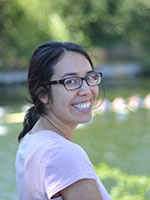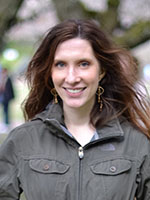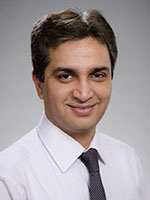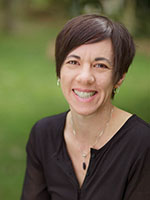January 4, 2017
2016-2017 Magnuson Scholar Updates
2016-2017 Magnuson Scholars:
Shatha Bamashmous
School of Dentistry
Laura Saganic
School of Medicine
Jonika Hash
School of Nursing
Devender Dhanda
School of Pharmacy
Sylvia Badon
School of Public Health
Danae Dotolo
School of Social Work
Scholar Updates
Shatha Bamashmous
School of Dentistry
I am sincerely honored to have been selected as recipient of 2016-17 University of Washington Magnuson Scholar. Over the past few months, the award has supported to a great deal my work not only financially but also emotionally by allowing me to grow professionally and achieve my academic goals. My research work focuses on the mechanism of maintenance of clinically health gingival tissue by the host. More specifically, the role of neutrophil as a key component of innate immune system, understanding how the host regulates neutrophil transit though gingival tissue is significant in that it will begin to define a key mechanism for the maintenance of gingival health. Since the award, I have made a substantial progress on my thesis in terms of data collection and analysis. In the past several months, I finished data and clinical samples collection for the second clinical study for my thesis. I am now in the process of analyzing samples using a wide range of advanced techniques. So far, the preliminary results have revealed very promising findings. This basis of knowledge may be built upon to enhance oral health interventions and care products; and develop a new paradigm in oral health prevention.
I am currently preparing for a manuscript and I am hoping to submit my work for poster presentation for an upcoming meeting. I also have used the funds to pay for professional memberships and cover cost of attending conferences, which provide me with a great opportunity to extend my professional network, explore collaboration opportunities and expand my knowledge about advancements in my area of research. I believe the Magnuson scholarship will support me further my future education and professional career.
 Laura Saganic
Laura Saganic
School of Medicine
Since receiving the Magnuson Scholarship, I have completed an ongoing research project with Drs. Roger Rosenblatt and Bianca Frogner, studying how the Affordable Care Act (ACA) impacted community health centers in Washington State. These clinics provide desperately needed primary care to Washington’s underserved communities, including management of diabetes and other chronic disease. My ACA research was presented at the Washington ACP conference and was recently published in the Journal of Ambulatory Care Management. The Magnuson award funded my studies in my fourth year of medical school. Following graduation in June 2017, I will begin my residency in Internal Medicine.
 Jonika Hash
Jonika Hash
School of Nursing
I am very excited to provide this progress report on how the Warren G. Magnuson Scholar award has supported my dissertation work examining sleep among infants and toddlers exposed to adversity. My dissertation is a secondary data analysis of a longitudinal randomized comparative effectiveness trial of a 10-week parenting intervention provided to biological parents of an infant or toddler under Child Protective Services (CPS) maltreatment investigation. Aims include (1) to describe parent reports about their child’s sleep and sleep problems and to compare these findings to previously published data about sleep among non-CPS populations, (2) to test children’s sleep as a predictor of later social emotional functioning, (3a) to test parenting sensitivity and exposure to early childhood adversity as predictors of children’s sleep and (3b) to test for an intervention effect on children’s sleep through parenting sensitivity.
The Magnuson award has supported my dissertation work by providing me with opportunities to engage in model development activities, gain new knowledge to inform my dissertation, clean and analyze data, and submit my work for presentation. Specifically, the award has supported the development of my model examining parenting sensitivity and early life adversity as predictors of children’s sleep, which was approved by my doctoral committee early fall quarter, 2016. The Magnuson award has also afforded me the opportunity to attend the Pennsylvania State’s 24th Annual National Symposium on Family Issues, Sleep across the Life Course, where I met experts in my field (Dr. Douglas Teti and Dr. Mona El-Sheikh) and learned about their work examining children’s sleep as it unfolds within parenting and family contexts. I have also had the chance to write and submit an abstract entitled Sleep Problems among Infants and Toddlers under Maltreatment Investigation for presentation at the SLEEP 2017 conference in June 2017. Finally, the Magnuson award has allowed me to begin the exciting task of data cleaning and analysis. Results so far suggest the amount of sleep obtained within a 24-hour period by our sample of CPS infants and toddlers is similar to that of a non-CPS sample of infants and toddlers; however, distributions of sleep across the 24-hour period differ. Results also suggest sleep problems predict later internalizing behavior problems among our sample of CPS infants and toddlers; and whether or not children have a reported sleep problem seems to be driven by their nightwakings and difficulties settling into sleep. Finally, results suggest increased exposure to adversity is associated with greater sleep problems, a finding which I believe can add to the literature linking adversity and sleep to diabetes. For my next steps, my goals include finishing data analysis and submitting findings for publication.
Thank you for this opportunity to provide an update. It is truly an honor to be a part of Senator Warren G. Magnuson’s legacy.
 Devender Dhanda
Devender Dhanda
School of Pharmacy
I express my sincere gratitude to be honored as one of the Warren G. Magnuson Scholars for 2016-2017 academic year at University of Washington, Seattle. The Magnuson scholarship has provided motivation and support for me towards my fourth year of Ph.D. work in Pharmaceutical Outcomes Research and Policy Program (PORPP). This past year, the funds from Magnuson scholarship helped me to sponsor myself to attend the Society for Medical Decision Making (SMDM) Annual International Meeting held in Vancouver, British Columbia. My research focus is the development of analytical frameworks for quantitation of evidence from genomic testing technologies. The evidence quantitation framework that I have developed to date utilizes methods grounded in evidence synthesis (meta-analysis) and a newer approach, value of information analysis (VOI). The value of information analysis holds significant promise in evidence quantification. I have submitted my first manuscript “Are evidence standards different for genomic- vs. clinical-based precision medicine? – A quantitative analysis of individualized warfarin therapy”, for publication to one of the top journals in the field. Briefly, I quantified the evidence for two approaches for individualization of warfarin anticoagulant dosing: pharmacogenetic testing for CYPC29 and VKORC1 variants, and dose reduction of warfarin in light of a warfarin-amiodarone drug interaction. Based on the results, I demonstrated that although evidence from pharmacogenetic-based individualization approach was stronger, the clinical guidelines recommend against the use of such approach.
I am in my fourth year Ph.D. and currently I am developing my dissertation proposal in the field of Precision Medicine, “Innovation, value, and uncertainty in Precision Medicine”. I am trying to create a framework for assessing the risks-benefits and change in the clinical and economic values of adding low to moderate risk genes on the hereditary breast cancer screening gene panels. The success of this project may help the stakeholders (patients, providers, and payers) make better-informed decisions regarding the risks and benefits of screening using the “extended” gene-panels. Warren G. Magnuson Scholarship has enabled me to pursue my studies/research in the field of comparative effectiveness research and helped me work towards my long-term goal of helping people live a healthier and longer life. I am passionate and committed toward research efforts for efficient translation of the novel medical technologies to clinical use. I am convinced that Warren G. Magnuson Scholarship has provided me necessary impetus and motivation to work on my scientific research and humanistic goals. I sincerely thank the College of Pharmacy for my nomination and the Warren G. Magnuson Institute for Biomedical Research and Health Professions Training for honoring me with Warren G. Magnuson Scholarship for 2016-17.
 Sylvia Badon
Sylvia Badon
School of Public Health
Over the past six months, I have been hard at work on my dissertation research, examining how a mother’s sedentary behavior and physical activity before and during pregnancy influence her child’s growth. This fall, I presented my findings on the association between maternal sedentary behavior and offspring birthweight at a web conference organized by the Society of Epidemiologic Research (SERdigital). During this time, the Magnuson Scholarship has supported my studies by covering a portion of my tuition. The Magnuson Scholarship has also supported publication of my research in well-respected academic journals. I recently published a paper on maternal lifestyle during early pregnancy and risk of gestational diabetes mellitus in the American Journal of Epidemiology.
In addition, the Magnuson Scholarship has allowed me to move forward with planning a trip to Denmark to conduct research using the Danish National Birth Cohort. This collaboration will enable me to include long-term health outcomes in children, such as metabolic diseases and growth, in my dissertation research. Without the support of the Magnuson Scholarship, I would have had to postpone my work with the Danish National Birth Cohort, as the data can only be analyzed in Denmark.
 Danae Dotolo
Danae Dotolo
School of Social Work
I could not be more grateful for the funding provided by the Magnuson Scholarship. The funding has freed me of teaching and other research obligations so that I am able to focus on my dissertation research. The time and mental energy available because of this funding has been invaluable. I have made significant progress on my analyses. I am analyzing 66 transcripts of interviews with LGBTQ adults about their interactions with health care providers while caring for seriously ill or dying partners. I am particularly interested in three aspects of partner experiences: 1) anticipatory concerns about discrimination and preparatory actions to avoid experiences of discrimination; 2) perceptions of discrimination and the mechanisms by which discrimination is expressed; and 3) the ways in which partners act in response to perceived discrimination. The aims of this research are to describe the burdens placed on partners who attempt to anticipate, mitigate and respond to discrimination, as well as to illuminate the strengths and agency exhibited by partners in their responses to discrimination experienced in clinical interactions. Preliminary findings suggest that partners have concerns when approaching health care interactions; further, they expend significant energy scanning the health care setting, picking up on overt and subtle expressions of discrimination, and adapting to perceived discrimination. Based on these findings, I hope to contribute to efforts to better support LGBTQ patients and their partners in the context of serious illness and end-of-life care.
The funding also enabled me to hire an assistant to help format and upload my data into an online qualitative analysis software program, and to research relationship recognition laws available to partners who participated in this study in the state and at the time of their clinical interactions. Additionally, I was able to attend the University of Alberta International Institute for Qualitative Methodology Qualitative Health Research Conference in Kelowna, BC in October, which informed the refinement of the methods I am using in my dissertation. I will also attend the Society for Social Work Research Annual Meeting in New Orleans, LA in January where I will present preliminary findings from my dissertation.